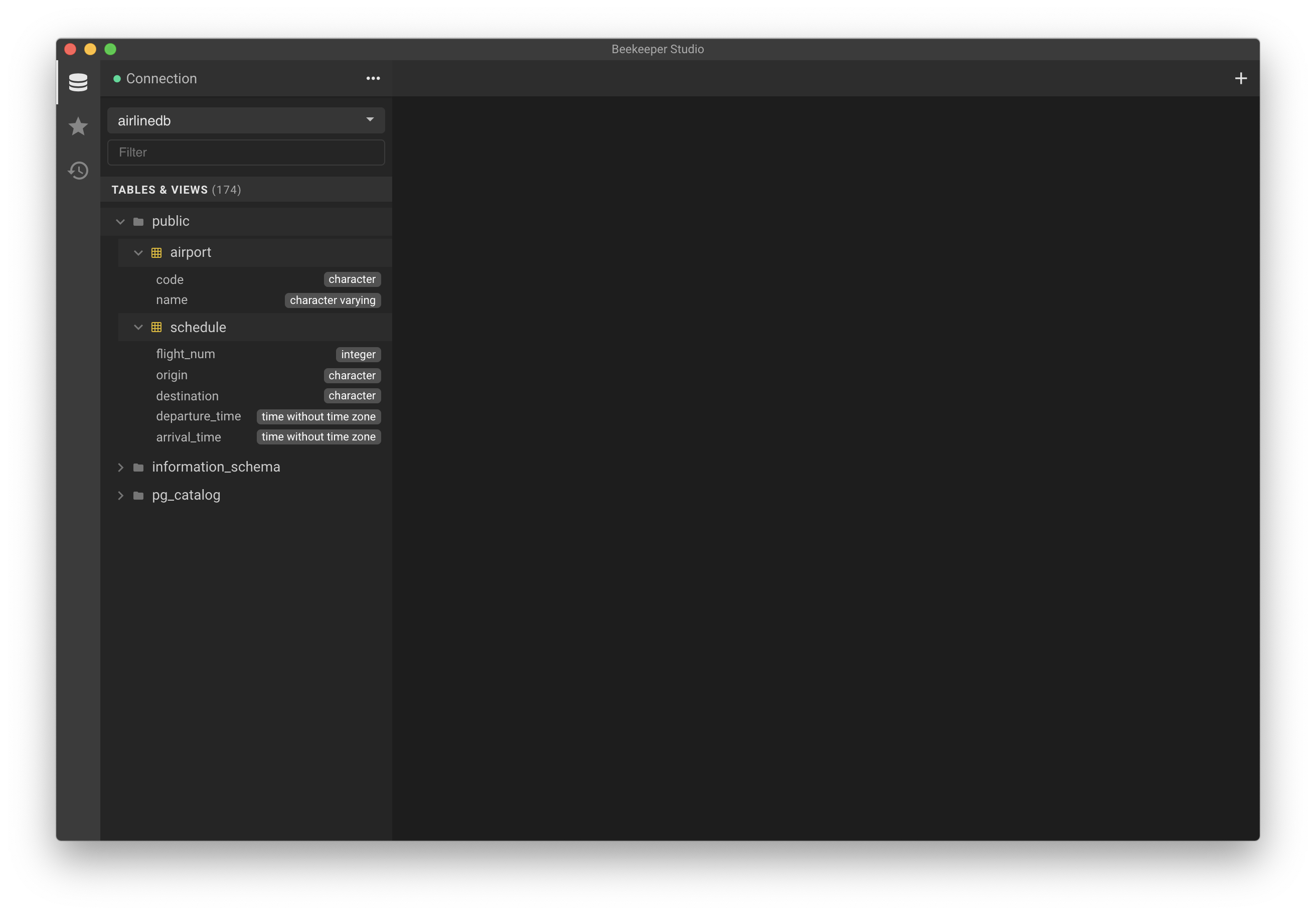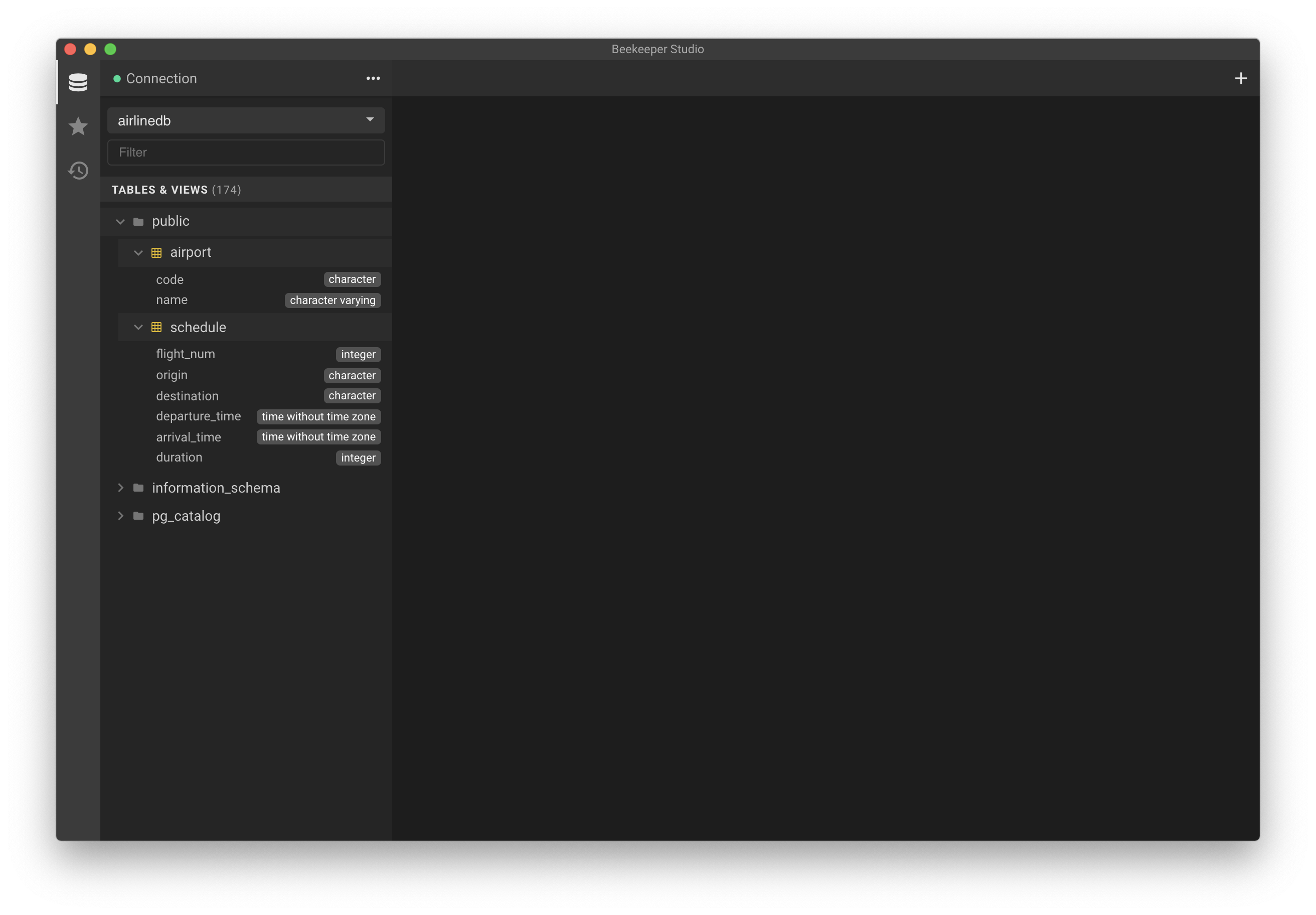Modify Table
In this step, we are going to deploy a table and then make a change to it.
Create the schedule table
Similar to the last step, let's create a schedule table that has the following schema:
To accomplish this, create a local file named schedule-table.yaml and paste the following contents into it:
apiVersion: schemas.schemahero.io/v1alpha4
kind: Table
metadata:
name: schedule
namespace: schemahero-tutorial
spec:
database: airlinedb
name: schedule
schema:
postgres:
primaryKey: [flight_num]
columns:
- name: flight_num
type: int
- name: origin
type: char(4)
constraints:
notNull: true
- name: destination
type: char(4)
constraints:
notNull: true
- name: departure_time
type: time
constraints:
notNull: true
- name: arrival_time
type: time
constraints:
notNull: true
After saving this file, deploy it using:
kubectl apply -f ./schedule-table.yaml -n schemahero-tutorial
Wait for this migration to be planned. Check on the migration status by running:
kubectl schemahero get migrations -n schemahero-tutorial
When the schedule table migration is ready, it will show up in the output:
ID DATABASE TABLE PLANNED EXECUTED APPROVED REJECTED
a9626a8 airlinedb schedule 21s
eaa36ef airlinedb airport 4h 3h 3h
Let's apply this migration:
kubectl schemahero -n schemahero-tutorial approve migration a9626a8
To confirm, open Beekeeper Studio and see the schedule table:

Change columns
Let's make a few changes to this table schema now:
- Make the departure_time and arrival_time columns nullable
- Add a new column named duration
To do this, open the schedule.yaml file and make these changes.
Remove the constraints from the departure_time and the arrival_time columns.
Add a new column named duration, type int, with no constraints.
The file should look like this:
apiVersion: schemas.schemahero.io/v1alpha4
kind: Table
metadata:
name: schedule
namespace: schemahero-tutorial
spec:
database: airlinedb
name: schedule
schema:
postgres:
primaryKey: [flight_num]
columns:
- name: flight_num
type: int
- name: origin
type: char(4)
constraints:
notNull: true
- name: destination
type: char(4)
constraints:
notNull: true
- name: departure_time
type: time
- name: arrival_time
type: time
- name: duration
type: int
Apply this change using kubectl:
kubectl apply -f ./schedule-table.yaml
Just like before, list the migrations:
kubectl schemahero get migrations -n schemahero-tutorial
This time, there will be a new migration pending:
ID DATABASE TABLE PLANNED EXECUTED APPROVED REJECTED
a9626a8 airlinedb schedule 9m30s 7m58s 8m0s
eaa36ef airlinedb airport 4h 4h 4h
fa32022 airlinedb schedule 5s
View the migration
We can now view the migration:
kubectl schemahero -n schemahero-tutorial describe migration fa32022
And the output is now:
Migration Name: fa32022
Generated DDL Statement (generated at 2020-06-06T14:56:04-07:00):
alter table "schedule" alter column "departure_time" type time, alter column "departure_time" drop not null;
alter table "schedule" alter column "arrival_time" type time, alter column "arrival_time" drop not null;
alter table "schedule" add column "duration" integer;
To apply this migration:
kubectl schemahero -n schemahero-tutorial approve migration fa32022
To recalculate this migration against the current schema:
kubectl schemahero -n schemahero-tutorial recalculate migration fa32022
To deny and cancel this migration:
kubectl schemahero -n schemahero-tutorial reject migration fa32022
Let's review this migration. The Generated DDL statements now include 3 different statements. SchemaHero has compared the YAML we just deployed to the actual database schema, and generated the commands above.
Approve the migration
Once again, we can approve this migration:
kubectl schemahero -n schemahero-tutorial approve migration fa32022
SchemaHero will show that it's been approved by printing:
Migration fa32022 approved
Verify in the database management utility
Refreshing the table view in Beekeeper Studio, we can see the change has been applied:

Adding a foreign key
Let's make another change.
This time, we want to add a foreign key to make sure that all data entered in the origin and destination columns are present in the airport table.
To add a foreign key, we can edit the schedule.yaml and add the foreignKey constraints to this table.
The updated table YAML will look like:
apiVersion: schemas.schemahero.io/v1alpha4
kind: Table
metadata:
name: schedule
namespace: schemahero-tutorial
spec:
database: airlinedb
name: schedule
schema:
postgres:
primaryKey: [flight_num]
foreignKeys:
- columns:
- origin
references:
table: airport
columns:
- code
- columns:
- destination
references:
table: airport
columns:
- code
columns:
- name: flight_num
type: int
- name: origin
type: char(4)
constraints:
notNull: true
- name: destination
type: char(4)
constraints:
notNull: true
- name: departure_time
type: time
- name: arrival_time
type: time
- name: duration
type: int
Once again, apply and view the migration:
kubectl apply -f ./schedule-table.yaml
kubectl schemahero get migrations -n schemahero-tutorialID DATABASE TABLE PLANNED EXECUTED APPROVED REJECTED
a9626a8 airlinedb schedule 22m 20m 20m
b12d3fd airlinedb schedule 54s
eaa36ef airlinedb airport 4h 4h 4h
fa32022 airlinedb schedule 12m 9m36s 9m44s
kubectl schemahero -n schemahero-tutorial describe migration b12d3fd
Migration Name: b12d3fd
Generated DDL Statement (generated at 2020-06-06T15:07:54-07:00):
alter table "schedule" alter column "departure_time" type time;
alter table "schedule" alter column "arrival_time" type time;
alter table schedule add constraint schedule_origin_fkey foreign key (origin) references airport (code);
alter table schedule add constraint schedule_destination_fkey foreign key (destination) references airport (code);
To apply this migration:
kubectl schemahero -n schemahero-tutorial approve migration b12d3fd
To recalculate this migration against the current schema:
kubectl schemahero -n schemahero-tutorial recalculate migration b12d3fd
To deny and cancel this migration:
kubectl schemahero -n schemahero-tutorial reject migration b12d3fd
You can see in the Generated DDL that the new foreign keys will be applied:
alter table schedule add constraint schedule_origin_fkey foreign key (origin) references airport (code);
alter table schedule add constraint schedule_destination_fkey foreign key (destination) references airport (code);
Approve and verify
Approve the migration:
kubectl schemahero -n schemahero-tutorial approve migration b12d3fd
You can use your database management utility to verify that the migration was applied, and the foreign keys now exist.
Next steps
Next, we'll review what we've done in this tutorial and help you figure out how to use SchemaHero in your environment.
